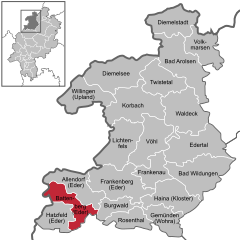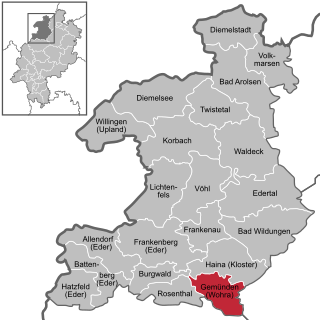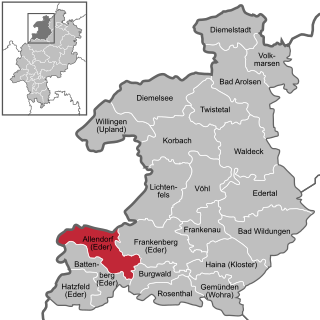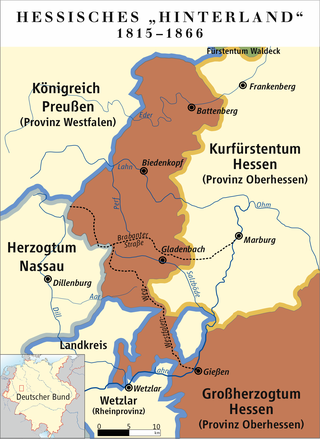Battenberg | |
|---|---|
 Oberstadt (Upper Town) with Neuburg (New Castle) | |
Location of Battenberg within Waldeck-Frankenberg district  | |
| Coordinates: 51°01′N08°39′E / 51.017°N 8.650°E | |
| Country | Germany |
| State | Hesse |
| Admin. region | Kassel |
| District | Waldeck-Frankenberg |
| Subdivisions | 4 Ortsteile |
| Government | |
| • Mayor (2020–26) | Christian Klein [1] |
| Area | |
| • Total | 64.73 km2 (24.99 sq mi) |
| Elevation | 340 m (1,120 ft) |
| Population (2022-12-31) [2] | |
| • Total | 5,500 |
| • Density | 85/km2 (220/sq mi) |
| Time zone | UTC+01:00 (CET) |
| • Summer (DST) | UTC+02:00 (CEST) |
| Postal codes | 35088 |
| Dialling codes | 06452 |
| Vehicle registration | KB |
| Website | www.battenberg-eder.de |
Battenberg (Eder) is a small town in the district of Waldeck-Frankenberg in the state of Hesse, Germany. It is located on the river Eder, a tributary of the Fulda, which flows into the Weser, and lies at the southeastern edges of the Rothaar Mountains. The closest larger cities are Marburg, Siegen, and Kassel, and the town is approximately equally far away from Frankfurt am Main, Cologne, and Dortmund.
Contents
- Geography
- Location
- Neighbouring communities
- Incorporated villages
- History
- Population development
- Politics
- Town council
- Coat of arms
- Town partnerships
- Adoption
- Notable people
- References
- External links
In 1624, Battenberg was incorporated into the Landgraviate of Hesse-Darmstadt (since 1806 the Grand Duchy of Hesse) as part of the so called Hessian Hinterland, an almost-exclave, which was connected to Upper Hesse (de) only through a tiny corridor west of Gießen. The "Hinterland" was annexed by the Kingdom of Prussia in 1866, and merged with the territories of the former Duchy of Nassau, to form the Province of Hesse-Nassau in 1868. From 1918 on, the town lay in the Free State of Prussia, and since 1945, it is in the federal state of Hesse.
Battenberg is the origin of the medieval House of Battenberg (de), which was not related to the House of Hesse and ruled over the County of Battenberg (de) until it died out in 1310, and of the Battenberg family (in German called the "Haus Battenberg" = "House of Battenberg"), a morganatic branch of the Hesse-Darmstadt branch of the House of Hesse, which ruled over, among others, the Landgraviate of Hesse-Darmstadt (later the Grand Duchy of Hesse) until 1918, and the Landgraviate of Hesse-Kassel (later the Electorate of Hesse) until its annexation by Prussia in 1866. The literal translation of Battenberg, "Mountbatten" (Berg = mountain), is used by members of the British royal family.
The Battenberg cake and hence also the Battenburg markings both indirectly derive their name from the town.

























